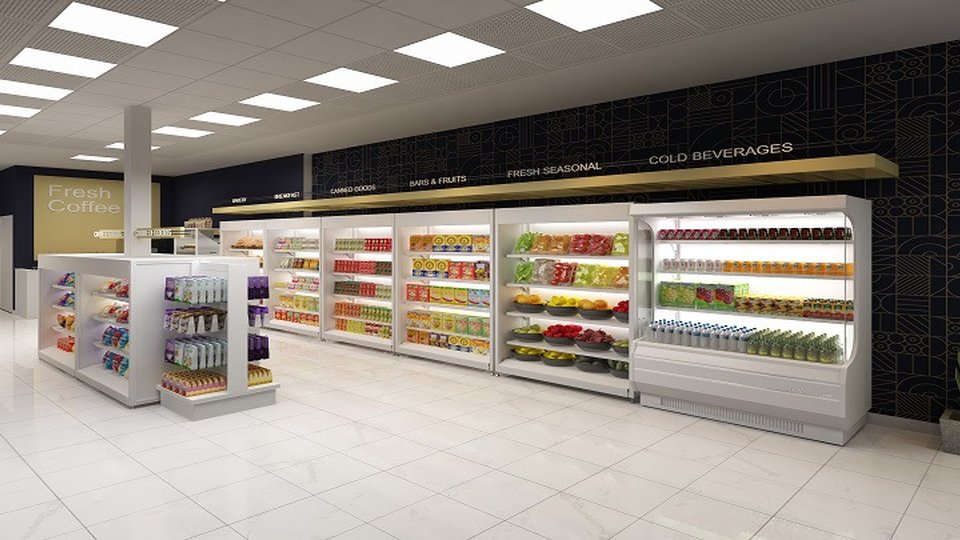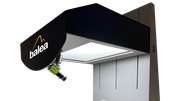Technology
Autonomous retail may soon offer more than a cashierless checkout experience
Amazon may have been the leader in putting cashierless autonomous checkout in play with its Amazon Go stores but competitors are nipping at its heels, including six-year-old Accel Robotics and its Valet Market.

June 17, 2021 by Judy Mottl — Editor, RetailCustomerExperience.com & DigitalSignageToday.com
When the phrase "autonomous commerce" pops up in discussions regarding retail customer experience, initial thoughts are ones about providing a quick and efficient checkout transaction.
But as one company views it, innovation is spurring the capabilities, as well as the scope, of autonomous commerce, and will propel it forward as a force in designing smart cities, reducing a retail operation's carbon footprint as well as food waste, and helping to ensure a neighborhood's needs are met on a local level.
That's how Accel Robotics' co-founders Martin Cseh, Marius Buibas and Brandon Maseda view the role autonomous robotics, computer vision and AI will play in the near future.
Cseh is an alum of Harvard and Gannett, and Buibas is former director of engineering for Brain Corp., a pioneer in autonomous mobile robots. Maseda was the founder and managing partner at theLift, a digital innovation group, and vice president of retail innovation at With.me, an on-demand retail platform.
At this point, the focus within autonomous retail is all about enabling checkout-free experience – a technology advancement led by Amazon's Go cashierless stores.
But whether Amazon stays in the lead is a big unknown given the numbers of competing innovators, including the six-year-old Accel Robotics and its Valet Market, a checkout-free shopping experience via a camera-based AI system that allows shoppers to enter a store, pick items, walk out, and get a receipt via text or app notification.
Valet Market is up and running in a San Diego high-rise community in 1,500 of retail space. Designed as a shared pantry, shoppers can buy locally sourced items, such as produce, baked goods and dairy, alongside convenience items on the store's smart shelves. The market is integrated with Last Step delivery services for residents, who can order goods through the store's mobile app for on-demand delivery straight to their door. Computer vision, shelf-level sensors and artificial intelligence automatically track products as shoppers remove them from the shelves.
Retail Customer Experience reached out to Maseda, Accel Robotics' CEO, to get deeper insight on how the company is approaching the autonomous retail transaction experience and how it intends to compete with Amazon and a growing competitor list.
Q. Can you share a little background to start about Accel Robotics.
A. We enable checkout-free retail solutions powered by computer vision and artificial intelligence. It's similar to Amazon's grab-and-go convenience stores but more cost-effective. We have had several complete stores deployed over the last 12 months under other brands; however, Valet Market is the first of Accel Robotics' owned retail brand. The market serves as a shared pantry for residents of Vantage Pointe in the East Village neighborhood of San Diego. It's also equipped with our proprietary Last Step technology which allows residents to have items delivered directly to their door in addition to 24/7 shopping. We are continuing to develop solutions for other brands as well, while we also showcase the full range of possibilities.
Q. So it seems your automated shopping experience can be put anywhere – from a train depot to a retail store space, etc. Are there specific requirements when determining a viable location?
A. Yes, our solutions can be used anywhere. The idea is to provide a better, more convenient, shopping experience by enabling new, smaller store formats with reduced carbon footprints that are much closer to where people live, work, travel, and play. We envision a future in which consumers can reduce their reliance on transportation to get basic items, and retailers have a higher number of micro-fulfillment centers closer to customers to easily fulfill their needs.
Q. What vertical (retail, entertainment, etc.) does Accel view as the "best fit" for the market and how did Valet Markets come to be at the Brookfield community?
A. The convenient and complete solution we bring allows application in a broad set of industries. The residential market is a natural early example since the always-open store easily translates to an extension of one's own pantry. We live, work, and play in San Diego which is how we came to open a location in Brookfield. We've also signed contracts with more than 10 nationally known retailers to open more autonomous retail options in the area, including locations at universities, sports arenas, military bases, pharmacies and convenience stores, and fuel stations. The list of eligible stores continues to grow and is virtually limitless.
Q. Are there other footprints where the technology can do well – such as a mini travel center store offering travel accessories?
A. Certainly; this technology could be deployed in travel centers, hotel lobbies, and sport stadiums. As a mini travel-center store, it would fit naturally in airports, train stations, tourist attractions, etc. This would free up store staff to improve the customer experience in other areas like tour and travel guidance, and help desk and customer service, amongst other advantages.
Q. The checkout free retail approach is definitely hot given the pandemic. How would you describe this technology, as a whole, at this point?
A. This technology was on a strong growth track before the pandemic; the recent environments have just accelerated the appreciation for the impact it makes possible. At the end of 2019, we raised $30 million in Series A funding, led by SoftBank Group Corp. We have continued growing in the time since and now we have three offices and over 85 employees, with big plans to keep growing.
The technology is capable of everything, from authentication as customers enter the store, to monitoring inventory as it is selected from shelves, tracking shopper flow, automated checkout, and receipt delivery, and more. The technology has come a long way and as a result, the experience for consumers is better, more natural, and truly automated. Gathering real learnings for the live deployments in the marketplace allows us to continually build upon our existing technology as we collaborate with more brand partners.
 ChatGPT
ChatGPT Grok
Grok Perplexity
Perplexity Claude
Claude




